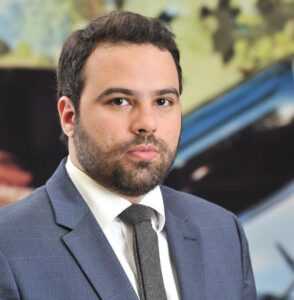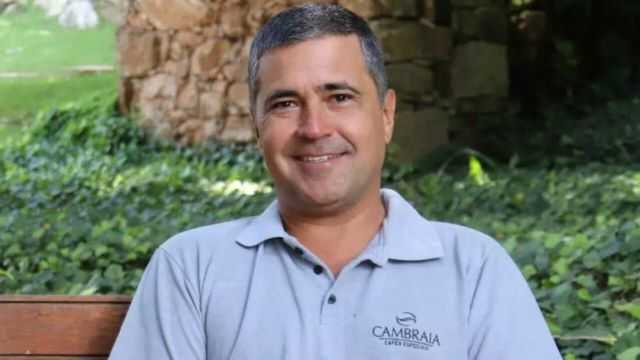MILAN – At the World of Coffee in Milan, we spoke with Henrique Cambraia, Brazilian Specialty Coffee Association (BSCA) President and Vinícius Estrela, Executive Director of BSCA. The focus of this exchange was the great change that Brazil has been going through in recent years, already recognized by commercial partners and experts in Asia, Italy, Europe and the United States, towards high quality and sustained quantity production, towards new flavours that could revolutionise the Brazilian and the global way of understanding coffee.
Cambraia, what is your estimate for Brazil’s coffee output in crop year 2022/23? Do you believe, as many traders do, that Brazil’s Arabica coffee crop could see an inversion in its production cycle that would result in a larger harvest in 2023?
Cambraia: “What we can see is that the Arabica crop this year in Brasil 2022/2023 is larger than 2021/2022, but it will not be as big as the one of 2020/2021, that has been one of the highest. In number it would be between 25 to 40 million bags of Arabica. It’ too early to be more specific, but it will be bigger than the last crop.”
What are your expectations for the quality of the crop?
“Average speaking, the quality is going to be very good. We had a good raining season from last october and February and now we’re suffering a very dried season which is good for coffee. Quality speaking, we’re very excited: maybe it will be one of the best crop of this year. It’s realistic to think so. When we have the rain during the harving season, than we have a problem. But otherwise, the potential for quality is very high.”
On a percentage basis, how much of Brazil’s coffee production can be usually considered as specialty?
“If we talked about 20 years ago, less than 5%. Nowadays, if we consider specialty coffees, sustainable produced, the social environmental, plus the identity of the growers, plus full traceability, and of course cupping scores up above 80 points according to q graders of Specialty coffee Association evaluation, we estimate that Brazil produces 8milions bag of coffee. If we consider the total production of 6 milions avarage speaking, than we are close to 13%-15%.
But if you consider only Arabica, than we have now 8 millions from 40% than we have almost 20% of Arabica that is specialty in Brasil. It’s important to say that Brasil is doing a very good work, quality speaking. More than ever Brasil has an increasing number of coffees above 86 points. Now Brasil is able to export containers from 86 coffees and above.
If we consider specialty coffee around 84 points, Brasil now is able to do more than a milion bags of coffee. Brasil is doing a good job improving the quantity and the quality of its specialty coffees. And expanding also the regions of production.”
What are the most promising geographical areas of expansion for the production of specialty coffees in Brazil?
“Higher are the altitudes, the better is the potential. But we have several areas that are really consolidated, like some mountains from Minais Gerais, Sul de Minas (South of the State of Minas Gerais),, vulcanic areas, the mountains in Espírito Santo, Bahia, São Paulo, the western parts of the State of Paraná… all these areas have much potential in producing specialty coffees. It’s not one or two anymore. Brasil is moving very fast in producing specialty coffees in different areas of the country, where we have, for example, the recognition of geographical indications.”
How is climate change affecting specialty coffee growing in Brazil?

Estrela:”Brasil is big enough to have a lot of potential areas for producing. The climate change is an issue, which coffee growers are continously addressing in Brazil through sustainaible practices, but it doesn’t affect these aspects of quality of our coffee.”
What kind of adaptation strategies are you developing and implementing in order to make specialty coffee growing more resilient?
Cambraia:”Let’s separate growing from the post harvest part: growing speaking, some researchers are developing in Brasil new varieties of Arabica that could be tolerant to high climate volability. Some are tolerant to cold weathers and others to dry seasons.
If we speak about the post harvest, Brasil is moving very fast. Why is it connected to climate change? Because, the more you control your process after harvest, the less you’re going to be affected by natural conditions. We start to anticipate the reaction of the coffee, according to the weather conditions. Brazilian and growers are creating protocols, to reach the best qualities according to the weather conditions.”
More and more, climate changing is producing volatile weather and Brazil, being the country that iis mostly remember when we talk about coffee, must be prepared.”
How were the results of Bsca’s coffee contests this year? What are the most compelling trends to watch out for?
“In 2020/2021 the results were amazing. After having a severe frost, we had to have good news. It was very good the highest average price. It went above 7 dollars for pounds. And we started to have new clients from Europe and elsewhere. A lot of them from Asia. It’s growing their interest: they’re very familiar with new bright acidities. The contrary of europeans, that prefer body and sweetness.”
Italy is one the most important markets for Brazilian coffees. How is Bsca promoting Brazilian specialty coffees in the Italian market? What are your most important targets?
“The importance of italian costumers for Brasil is well known. We have to show them that if they move from their traditional patterns in their minds, they could improve their base for espresso. Keeping the traditional body, sweetness and low acidity from Brasil. But they can add more Brazilian coffee into their blends, substituting some central americans and african coffee, with new flavours from Brasil with bright acidities on a more competitive price.
This is how we can tell to italian roasters not to look anymore to Brasil, as they are already doing by the wat, only as traditional supplier of Santos coffee. You can find in Brasil a larger shelf for espresso.
Don’t forget there’s a new generation of consumers coming and Brasil has new profiles, which had never been considered from our country: with super acid, with flavours, sweetness, fruitness, red cherries, that you used to find in Africa or Central America, now you can discover in Brazilian coffees.
I went to visit more than 20 consumers in Livorno that we have: the gentlemen, close to his seventy years old, said “I want to know how did you produce this coffee, because it seems african one” and his daugher -30 years old- just said “I love this coffee, this is something new and I have a lot of consumers that wants that”.
We keep our Brazilian pattern of tradition, but with much more complexity, quality and sustainability. Our Embassy in Italy helps us a lot in communicating that message of growing quality and sustainability in Brazilian coffees, making them unique. ”
Bsca is also promoting courses for R-Graders. What is your take on Robusta specialties? Is it possibile to consider high-quality Robustas specialty coffees?
“The Arabica growers are maybe one or two decades ahead of Robusta producers. But we have Robusta farmers in Brasil that are highly investing in the fermentation process, fully washing their Robusta. It’s going to be for Robusta a the change that Arabica has been doing for the last 30 years. The Robusta specialties are in their beginning, but thy’re going to move very fast. They will be an important part of brasilian coffee in the coming years.
Nowadays, if an italian roaster wants to create an espresso blend, i can tell you at 100% percent that he can find all the coffees in our country: the Robustas, the Arabicas, the
“Africans”, the “centrals” and the Brazilians. We have a hudge portfolio of aromas and profiles. Why? Because growers improved their post harvest skills.”
Estrela: “It’s not the future, it’s the reality in Brasil. They have done a great job and now it’s the time to communicate and spread this message also in Italy. Brasil has prepared a really huge basket of sensations, coffees, qualities, during the last years. We have to show this coffee, to share this kind of news, Arabica and Robusta, to Italian consumers.
The complexity of all the new flavours are much more than the traditional from Santos: they will make a difference for the italian coffee community. If italians will taste and buy more Brazilian coffees, as they are already doing, they will be very happy because they will drink better and competitive coffees, not to mention the common history of our countries through coffee, which is an added value that only Brazilian coffees have. For all that reasons (quality, sustainability, quantity, consume, history and human aspects), our position is that Brasil is the Coffee Nation. When you think about coffee, you think about Brasil: it’s as simple as that.
It’s decades and decades of investing, improving and making history and friendship with other countries and you can taste it.”


















